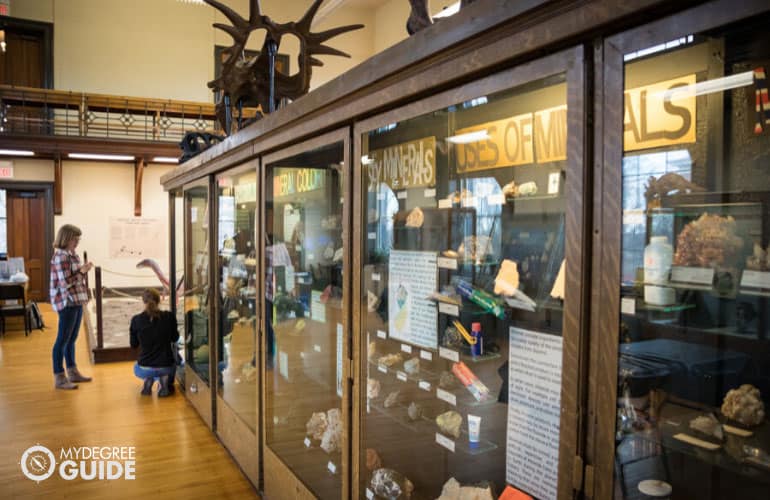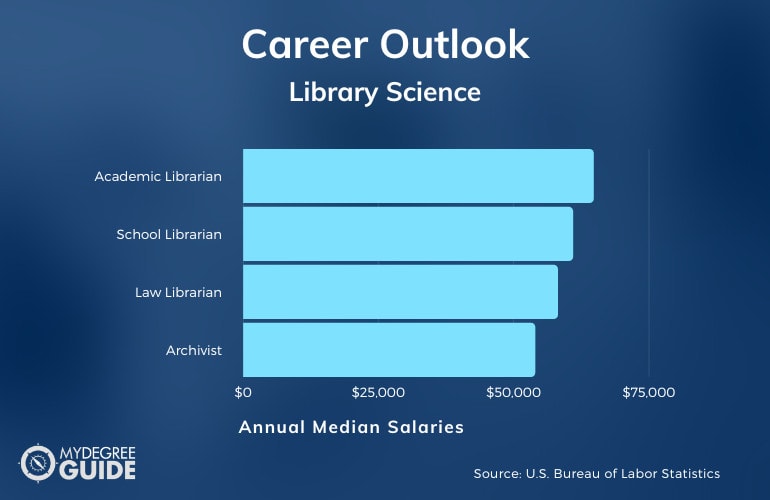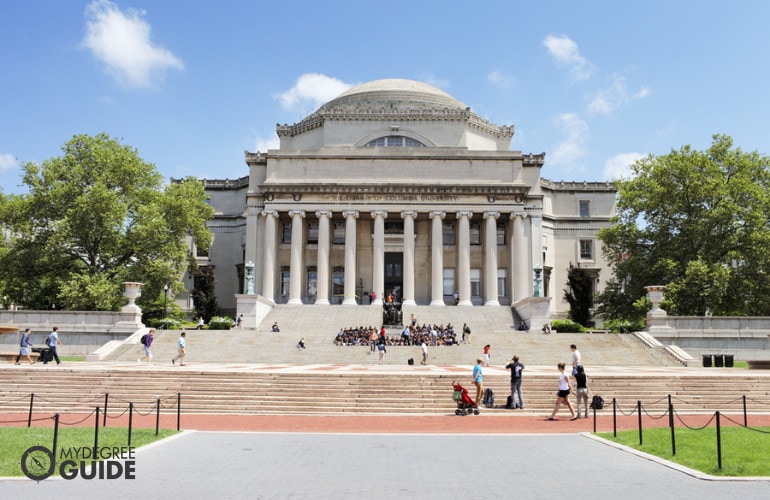Explore Masters in Library Science Online for 2024. Compare schools with NO GRE required. Accelerated classes available.

While you may not need any specialized education to work at your local library’s circulation desk, earning the official title of librarian will require earning a Master of Library Science.
A no GRE online MLS program can prepare you for leadership roles in public, school, academic, or special libraries.
Editorial Listing ShortCode:
List of Universities Offering Masters in Library Science Online No GRE Programs
Methodology: These universities and colleges are in good standing with their accreditation boards and offer online programs to earn a master’s in library science with no GRE requirement for admission or offer GRE waivers for qualified candidates.
1. Clarion University
Clarion University of Pennsylvania was established in 1867 and remains based in the city of the same name. This is a public institution with strong ties to the Pennsylvania State System of Higher Education. They possess a rural campus that encompasses over 201 acres and serves over 4,500 students, most of them undergraduates.
- Master’s in Information and Library Science
Clarion University‘s programs are accredited by the Middle States Commission on Higher Education.
2. Drexel University
This private research-focused university was established in 1891 as the Drexel Institute but acquired full university status in 1970. They are based in Philadelphia, Pennsylvania, where they possess a large urban campus that serves over 24,000 students.
Drexel University is particularly noted for its cooperative education method, which offers paid work experience before graduation.
- Master’s in Library & Information Science
Drexel is regionally accredited by the Middle States Commission on Higher Education (MSCHE).
3. East Central University
East Central University is located in Ada, Oklahoma. They are a public institution and are part of the Oklahoma Regional University System. It was originally established in 1909 as a Normal School and now serves 3,577 students.
They are a part of the Great American Football Conference, with 11 different sports teams.
- Master’s in Library Media
East Central University is regionally accredited by the Higher Learning Commission.
4. Emporia State University
Emporia State University is a state institution based in Emporia, Kansas. It was founded in 1863 under the motto “Changing lives for the common good” – and as they have transitioned from a country Normal school into a full-fledged University, they have never left their commitment to justice and research behind.
They now have almost 6,000 students on campus, which is famous for its Towers Complex. This is the place where all incoming freshmen live, and it offers a recently renewed facility and an active social calendar.
- Master’s in Library Science
Emporia State is accredited by the Higher Learning Commission.
5. Middle Tennessee State University
Sometimes known as MT or MTSU, the Middle Tennessee State University was established in 1909 as a Normal School in the small city of Murfreesboro. They now possess a suburban campus that encompasses over 500 acres of libraries, lecture halls, and residences.
They now serve over 21,000 students, who can enjoy access to highly ranked football and tennis teams. Some of their notable alumni include Nobel-Prize Winner James Buchanan and NFL quarterback Kelly Holcomb (Wikipedia).
- Master’s in Library Science
Middle Tennessee State University is accredited by the Commission on Colleges of the Southern Association of College and Schools Commission on Colleges (SACSCOC).
6. North Carolina Central University
North Carolina Central University, established in 1910, is a public Historically Black University. They are based in the city of Durham, North Carolina. Many of the lecture halls on this campus are regarded as historical buildings. They now have 8,200 students, who can partake in First Division NCAA football or a bi-weekly newspaper.
- Master’s in Library Science
North Carolina Central University is accredited by the Southern Association of Colleges and Schools Commission on Colleges.
7. Old Dominion University
Old Dominion University is a public research university located in Norfolk, Virginia. It was established in 1930 and is now one of the largest universities in Virginia. It has more than 24,000 students and offers 73 bachelors, 43 masters, 22 doctoral and two education specialist programs.
ODU is an entrepreneurial-minded doctoral research university that supports entrepreneurship and innovation among its community. The excellent classroom experience and mentoring that the university offers prepares the learners for life after graduation.
- Master’s in Library and Information Studies
Old Dominion University is accredited by the Southern Association of Colleges and Schools Commission on Colleges (SACSCOC).
8. San José State University
Sometimes known simply as SJSU, San Jose State University is a public university based in San Jose, California. Their well-managed space-grant also allows them to conduct significant research activity and has afforded them extra prestige in the STEM Fields.
They were founded in 1857 and are part of the California State University system. Their logo and motto of “Powering Silicon Valley” speaks highly of their eagerness to embrace change and development. They have nearly 34,000 students on both their campuses – the main urban one, and a satellite “South Campus” south of San Jose.
- Master’s in Library and Information Science
San José State is accredited by the Western Association of Schools and Colleges (WASC).
9. Simmons University
Established in 1899, Simmons University began as a women’s-only college located in Boston, Massachusetts. This private university is now co-educational but still focuses strongly on women’s education, especially at a postgraduate level.
They serve nearly 5,000 students. This university has a strong and proud history of educating ethnic minorities and non-binary students.
- Master’s in Library and Information Science
Simmons University is accredited by the New England Commission of Higher Education (NECHE).
10. Southern Connecticut State University
Sometimes known as SCSU, the Southern Connecticut State University is based in New Haven, Connecticut. As their name indicates, they are a public university and part of the State’s University System. It dates back to 1893 and now serves over 10,000 students, most of them undergraduates.
Its urban campus is located near the border between the cities of New Haven and Hamden and encompasses over 160 acres of academic and residential buildings.
- Master’s in Library and Information Science
Southern Connecticut State University is accredited by the New England Commission of Higher Education.
11. St. John’s University
Located in New York City, St John’s University is a private Catholic institution. They were founded in 1870 by a Vincentian Congregation. In addition to their main campus, which is located in Queens, they also have satellite locations in Staten Island and Rome.
They currently serve over 21,000 students. Their athletic teams are part of the NCAA Division I.
- Master’s in Library and Information Science
St. John’s University is accredited by the Middle States Commission on Higher Education.
12. Trevecca Nazarene University
Located in Nashville, Tennessee, Trevecca Nazarene University is a private Christian college that was established in 1901. They were originally founded by a Presbyterian minister but are now affiliated with the Nazarene Church.
Their 3,200 students can enjoy a wide array of activities and facilities on their urban campus, which include 15 different sports teams, student government, and an ROTC program.
- Master’s in Library and Information Science
Trevecca Nazarene University is accredited by the Southern Association of Colleges and Schools Commission on Colleges.
13. University at Buffalo
The University at Buffalo offers a Master of Science degree in School Librarianship. The program, which is designed to be 4 semesters long, can be completed online.
A field experience course and an LMS Practicum are required to graduate. Applicants must submit GRE test scores, 3 letters of recommendation, and transcripts from all post-secondary institutes attended.
- MS in School Librarianship
The University at Buffalo is accredited by the Middle States Commission on Higher Education.
14. University of Alabama
Sometimes also knows as UA, the University of Alabama is a public university located in Tuscaloosa, Alabama. They date back to 1820, which makes them the oldest university in its state. They possess a sea-grant and a space grant, which they have used to fund significant research activity.
When they were first established, they were among the first places in the frontier region where higher education was available. Ever since, they have grown to have 33,000 students, who carry on the legacy of its influential early alumni. Their football team, the Crimson Tide, plays in the NCAA Division I.
- Master’s in Library and Information Studies
The University of Alabama is accredited by the Commission on Colleges of the Southern Association of Colleges and Schools.
15. University of Arizona
The University of Arizona is based in the city of Tucson. This is a public research-focused university that dates back to 1885. They have over 45,000 students, which makes them one of the largest universities in the state. In addition, they also employ over 3,500 faculty members.
Their sports teams, including their highly ranked football team, participate in the NCAA Division I Pac-12 Conference.
- Master’s in Library and Information Science
The University of Arizona is accredited by the Higher Learning Commission.
16. University of Central Missouri
The University of Central Missouri was established in 1871 and is a public university based in the city of Warrensburg, Missouri. They possess a wide rural campus that encompasses 1,561 acres of buildings, fields, and a nature trail. They currently serve 14,395 students, most of them undergraduates.
They house a wide variety of varsity sports teams, which include award-winning basketball and football programs.
- Master’s in Library Science and Information Services
The University of Central Missouri is accredited by the Higher Learning Commission (HLC).
17. University of Denver
The University of Denver works on a mission to deliver enduring professional growth and personal development to adult learners by providing them with alternative educational pathways. The university provides career-focused courses that are relevant to whatever career students pursue.
Students work at leading organizations throughout the country, which makes their classes a learning environment to discuss and share best practices and learn from each other. Courses are offered 100% online or in the evenings on campus, thus providing programs that are flexible to meet students’ schedules and needs.
- Master’s in Library and Information Science
The University of Denver is regionally accredited by the Higher Learning Commission (HLC) of the North Central Association.
18. University of Houston – Clear Lake
The University of Houston – Clear Lake was established in 1971 as a public institution meant to expand access for in-state students around the city of Houston. It has almost 9,000 students divided among four academic colleges, who are mostly served and housed around their suburban campus.
In addition, their students have preferential access to the Texas Medical Center. Notable alumni include several astronauts and U.S. Congressmen.
- Master’s in School Library and Information Science
UHCL is accredited by the Commission on Colleges of the Southern Association of Colleges and Schools.
19. University of Iowa
The University of Iowa, also known as UI or simply Iowa, is a publicly managed university that has a strong focus on research study. It operates a 1,880-acre urban campus in Iowa City, Iowa.
It was founded in 1847 as the States University of Iowa. Current census data has their population figures at just under 33,000. About 24,000 of these are undergrads, and about 9,000 are postgrads.
Their sports teams are called the “Hawkeyes.” They are playing in the NCAA Division I –Big Ten.
- Master’s in Library and Information Science
The University of Iowa is accredited by the Higher Learning Commission (HLC).
20. University of Kentucky
The University of Kentucky is one of the state’s biggest public universities. It is located in Lexington, Kentucky, where they have access to a land-grant. In addition, they also have the largest student body of the state, with nearly 30,000 students as of 2015.
The University of Kentucky has long been known as a major football college. Their team, the Wildcats, is one of the most successful ones in the NCAA Division I. The university now is firmly committed to using its football success and the revenue it generates to increase its research activity.
- Master’s in Library Science
The University of Kentucky is accredited by the Southern Association of Colleges and Schools Commission on Colleges.
21. University of Maryland
The University of Maryland is located in College Park. It is the flagship institution within the publicly run University of Maryland System. They were founded in 1856 as an Agricultural College but managed to grow and earn significant grants thanks to their proximity to Washington, D.C.
They now possess land, sea, and space grants, as well as a number of joint projects with the National Institute of Health and the NADA. Their football team plays in the NCAA Division I in the Big Ten Conference.
- Master’s in Library and Information Science
The University of Maryland, College Park is accredited by the Middle States Commission on Higher Education.
22. University of Missouri
The University of Missouri is located in the city of Columbia, Missouri. It is the largest public research university in the state. Their origins date back to 1839, and they formed the country’s first School of Journalism in 1909.
Currently, they serve over 30,000 students in their wide 1,200-acre campus. As it is located in a college town, students at the university provide an important engine to Columbia’s economy. The campus itself is full of historical landmark buildings.
- Master’s in Library and Information Science
Mizzou is accredited by the Higher Learning Commission.
23. University of North Texas
The University of North Texas is a public institution that dates back to 1890, when it was founded as a Teacher Training Institute in the city of Denton. After merging with the local normal college, they became a full-fledged university in 1961.
The university now has approximately 40,000 students and almost 2,000 faculty members. Their students can access an active Greek Life scene and several honors societies.
- Master’s in Library Science
The University of North Texas is accredited by the Southern Association of Colleges and Schools Commission on Colleges.
24. University of Northern Iowa
Located in the college town of Cedar Falls, Iowa, the University of Northern Iowa is a public university that dates back to 1876. They now serve over 10,000 students, with the overwhelming majority of them coming from within the state.
This university first started out as a Teacher Training Center meant to care for Civil War veterans. Nowadays, their course catalog is much wider, but they still have a strong focus on community outreach programs.
- Master’s in School Library Studies
The University of Northern Iowa is accredited by the Higher Learning Commission.
25. University of Rhode Island
The University of Rhode Island was originally established in 1982 as an Agricultural and Mechanical College. It is now a full-fledged public research university with a land grant and a sea grant.
The main campus is located in Kingston, encompasses 1,254 acres, and houses over 17,000 students. Most of its students are Rhode Island residents, which allows them to access competitive in-state tuition rates.
- Master’s in Library and Information Studies
The University of Rhode Island is accredited by the New England Commission of Higher Education (NECHE).
26. University of Southern California
The University of Southern California was established in 1880 and remains to this day a privately-run facility. However, they possess both a sea-grant and a space grant, which helps them fund their research efforts. Their main campus is located in Los Angeles, where they are considered to be one of the top private employers, according to Los Angeles Almanac.
Their over 45,000 students carry on a highly-renowned scientific legacy: the USC is one of the places that originally developed ARPANET, a precursor of the internet. They also designed the current domain name system.
- Master’s in Library and Information Science
USC has been accredited by the Western Association of Schools and Colleges (WASC) since March 6, 1949.
27. University of Washington
The University of Washington is a public institution based in the city of Seattle, Washington. They date back to 1861 and were originally established as the “Territorial University of Washington.” Their main campus is strategically located in the center of the city of Seattle, but they maintain two satellite campuses in Tacoma and Bothell.
Currently, they gave approximately 47,000 thousand students, which makes them the most populous university in their state. Their sports teams are nicknamed the “Huskies,” and they play in the NCAA I Division.
- Master’s in Library and Information Science
The University of Washington is accredited by the Northwest Commission on Colleges and Universities (NWCCU) and is a member of the Association of American Universities.
28. Valdosta State University
As its name indicates, Valdosta State University is a public institution centered in the town of Valdosta, Georgia. They date back to 1906 and were originally a Woman’s College. However, they are now fully co-educational.
Their main campus comprises 168 acres of suburban and rural land and serves over 11,000 students. Their varsity sports teams participate in the NCAA Division II Gulf South Conference.
- Master’s in Library and Information Science
Valdosta State University is accredited by the Southern Association of Colleges and Schools Commission on Colleges (SACSCOC).
29. Wayne State University
Wayne State University, founded in 1868, is located in Detroit, Michigan. This is a publicly supported university with a land grant. This university is a part of the University Research Corridor of their state, and as such, it is strongly focused on STEM fields.
Currently, its student body is of over 27,000 people, and it supports an active Greek Life scene and a highly competitive hockey team.
- Master’s in Library and Information Science
Wayne State University is accredited by the Higher Learning Commission.
30. Western Kentucky University
WKU, located in Bowling Green, Kentucky, was founded in 1906 as a public university. Current enrollment is approximately 20,000.
Besides the main campus, there are satellites in 3 other locations around the state. This is another school that has undergone several name changes and even location changes. In its current iteration, it offers programs in a wide variety of study areas.
The “Hilltoppers” and “Lady Toppers” play in C-USA.
- Master’s in Libraries, Informatics and Technology in Education
Western Kentucky University is accredited by the Southern Association of Colleges and Schools, Commission on Colleges.
Online Master’s in Library Science Programs
What’s most interesting to you about library science? Would you prefer to help students select books that spark their love of reading, or would you like to help public library patrons track down vital information?
If you have a plan for the type of library work you’d like to do, pursue a concentration with your library science degree. Through focused classes, your coursework can specifically prepare you for your future career.
Academic Librarian

If scholarly research excites you, then you could be a great fit for an academic librarianship track. Students in this discipline work to acquire skills to help college students, school faculty, and other academic researchers find the information that they need.
Commonly studied topics in this track include digital materials, communications for academic settings, technology systems, and website design. Since academic librarians often need to have specialized knowledge, this concentration is suited for students who already hold a graduate degree in another subject area or those who plan to obtain a second degree.
Law Librarian

Students who are interested in working in legal settings may want to consider a law librarianship concentration. The classes for this specialization may include Law Library Administration and Legal Research Instruction. You can study topics like law library collections, legal ethics, digital research, statute history, and copyright laws.
With this degree concentration, you may choose to further specialize in a subject matter like patents, foreign law, or antiquarian legal documents. In most cases, you won’t need to pair this specialization with a law degree to find work in the field.
Public Librarian

With a degree concentration in public librarianship, you can learn about managing a library facility as well as providing information resources to the public. Public librarians often become responsible for community recreation, involvement, advocacy, and support, and they may work with library patrons of all ages.
Because a job in this field can involve so many different daily activities, your master’s program can cover a broad range of topics. The curriculum may address literacy promotion, youth literature, cultural diversity, information technology, library marketing, and organizational leadership.
School Librarian

With responsibilities that range from classroom management to book selection, K-12 school librarians require a unique set of skills. In a school librarianship program, you can study children’s and young adult literature, school technology, information gathering, administrative skills, and collection curation.
You should expect to read many children’s and young adult books during your studies; the reading list may include an extensive selection of award-winning titles. To pursue this concentration, you may need to hold teacher certification in your state and have teaching experience.
Special Librarian

Some librarians need a very specific set of skills, and preparation may require pursuing a special librarianship concentration. One example is healthcare librarianship; for this career path, you may need to study informatics, business information, and health promotion.
Another career goal that would benefit from this type of degree is becoming a curator for a museum library; applicable course topics might include appraisal, document selection, and digital archiving. Special librarians may also work in corporate or government settings.
Sample Courses in an Online Master’s in Library Science Program

As a library science student, you can learn valuable research, curation, archiving, and technology skills. Your program can also help you develop your abilities as a communicator, an advocate and an educator.
During your graduate studies, the curriculum is likely to include classes like the ones below.
Information Technology
For many librarians, technology is an integral component of their work. Many records and archives are stored digitally, and library patrons often rely on staff to teach them how to use technology.
In an IT class, you can develop a foundation for digital library practices. You may learn about databases, networks and digital media, and you can discuss legal and ethical issues that may arise when working with digital library materials. Additional topics may include education technology and digital citizenship. You can gain both theoretical knowledge and hands-on skills in this class.
Intro to Library Science
This introductory class can establish the framework for the rest of your master’s studies, so it will probably be one of the first courses that you take. The curriculum typically covers the historical and current trends in library practices and the ways that librarianship influences other fields.
You can learn about the ethics and legalities that affect library work and discuss ways to ensure that your facility’s materials reflect multiculturalism and diversity. You may spend a good deal of time learning about information — where it can be found and how to identify reliable sources.
Managing Government Publications
During your time in this course, you can become familiar with the many types of publications that the government puts out, and you can also learn about the sorts of information that the government stores.
Increasing your knowledge of these topics can prepare you to help people obtain access to the government records or publications that they need. You may direct library patrons to the Federal Depository Library Program, online information systems, or other resources.
Debates and discussions with your classmates may address topics like what information the public has a right to demand.
Planning and Marketing for Libraries

Successful library administration requires keeping the patrons in mind when designing programs and services. This course can help you develop leadership and administrative skills that you can put into practice as you analyze community needs, brainstorm programs, and evaluate the results.
You can also learn strategies for raising awareness of your library’s services and ideas for creating a positive reputation as a valuable community resource. The class may also help you learn about budgeting and other tools that can help you craft a long-term plan for sustainability and growth.
Preservation and Conservation
For publications and documents to last for the long haul, they must be handled with care. Learning the principles of preservation can help you know how to do your part to conserve antique publications. Some of the techniques may help you keep modern books in good shape as well.
Digital archiving is an important method for retaining the content of old newspapers and other documents, so you may learn about specialty tools and programs for that task. You may also touch on some of the state and federal institutions that house historical documents.
Public Library Services
Patrons of all ages rely on the services of community libraries. As a public librarian, you’ll need to keep kids, teens, and adults in mind as you stock books and develop programs. In this class, you can discuss the value of libraries in the digital age and learn how to advocate for library funding and support.
Other topics may include overseeing a budget, promoting literacy, building connections with patrons, offering technology guidance, incorporating eBooks and other digital media, and providing readers’ advisory services. This class may also include introductions to program development and library marketing.
Research Methods
As a librarian, you’ll often be the one that others turn to when they need help finding information, and you’ll need to know where to find it. The more research skills you possess, the better you’ll be at digging up answers.
Whether you’re helping a public library patron find a beloved childhood storybook or assisting a lawyer with a legal case, your research abilities may have the power to save the day again and again. In this class, you can learn how to perform research in various settings, determine the reliability of sources and interpret data.
Careers in Library Science

If you have a library science degree in mind, then you probably have your sights set on being a librarian. But what kind of librarian will you become? Experts in library science can choose to pursue various specialties within this field.
On average, librarians earn $59,500 each year, according to the Bureau of Labor Statistics. Jobs are projected to grow at a 5% rate through the next ten years.
Academic Librarian
To work in a university setting, pursue a career as an academic librarian. In a college library, you’ll have opportunities to support the research efforts of students and faculty members.
Depending on the size of the university, you may oversee operations for the school’s only library, work in one specific department of the main library, or dedicate your time to a specialized library on the school’s campus.
In addition to curating collections, assisting patrons, managing library technology and maintaining databases, you may also conduct research in the field of library science.
The average academic librarian earns around $64,750 annually.
Archivist
If preservation is your calling, then archiving might be your ideal line of work. As an archivist, you’ll take steps to make sure that historical documents and publications will last for a long time to come. You might appraise new findings, build collections, and store items carefully.
To promote longevity, you might have to enforce rules about who can access your historical collections. Your responsibilities may also include creating digital backups of items and filing those copies in an organized fashion.
Archivists make an average annual salary of $53,950, and jobs are growing at a rate of about 8%.
Digital Librarian
One of the most modern positions in the field of librarianship is that of the digital librarian. If you choose to go this route with your career, you’ll be in charge of maintaining a collection of electronic books or other digital media.
Additionally, you might be tasked with training library patrons on how to use these materials. In some library systems, you may have additional tech responsibilities, such as maintaining the library’s social media presence or showing patrons how to use computer programs. People may also depend on you to perform online research and quickly find answers to their questions.
Law Librarian
For a career that combines legal work with information research, consider law librarianship. For this job, you may work in a law school, a law firm, a court system, or the legal department of a business.
One of your main responsibilities may involve helping library patrons find the information that they need. For some jobs, rather than just helping others conduct their research, you will also perform your own legal research. You may be in charge of collecting new resources for the library and maintaining good records.
Law librarians earn an average annual salary of $58,140. Some positions require a law degree.
Public Librarian
The role of the public librarian is the aspect of librarianship that’s most familiar to many people. As a leader in a public library, you might serve as the facility director or work in a specific department, such as adult, children’s, or youth services.
No matter which area you work in, you might be responsible for helping match readers to books, providing research assistance, helping patrons use library technology, creating community outreach or literacy programs, and marketing the library’s services. In addition to overseeing books, media and digital resources, you may also manage a team of library staff.
School Librarian
Did your love for books and libraries begin in childhood? If so, you may want to pursue a career as a school librarian so that you can help other children cultivate a desire to read. You can work in an elementary or secondary school to maintain a collection of age-appropriate reading materials to share with young learners.
Additionally, you may be responsible for helping students learn how to use the library and assisting as they conduct research for school projects.
On average, school librarians earn $60,940 per year. Because there are teaching responsibilities involved, most school librarians must be licensed teachers.
Professional Library Science Organizations

You can increase your connection to the librarianship field by joining a professional organization. These groups often welcome students to join.
Your membership may grant you privileges like access to industry publications or local meetings. Joining an association can also give you the chance to network with other librarians, which may lead to future job opportunities.
- American Association of School Librarians: This independent division of the ALA works with school librarians around the globe. Student memberships are encouraged, and there is a special interest group for students.
- American Library Association: ALA accredits librarianship programs, and you may need a degree from an ALA-accredited program to qualify for many librarian positions. In addition, ALA offers memberships to individuals and organizations. Benefits include conferences, online forums and educational classes.
- Association of College and Research Libraries: Academic librarians are encouraged to join ACRL, a division of ALA. One of the many benefits is access to a wide variety of PDF documents and online articles.
- Library and Information Technology Association: Anyone whose library job involves technology may appreciate membership in LITA, another one of ALA’s many divisions. The organization issues multiple scholarships each year, promotes the use of IT in library settings, and offers publications and online resources to keep professionals informed.
- Public Library Association: PLA is the ALA division specifically dedicated to support and advocacy for public librarianship. Members have access to discounts, a magazine, a newsletter and online resources.
- Special Libraries Association: SLA represents librarians who work in the fields of business, law, science, military, healthcare, history and more. Student memberships include discounts, salary-comparison tools, job listings and more.
Give yourself a professional advantage by joining one or more of these organizations while in school.
Accreditation

There are many factors to consider when selecting a grad program for library science, and accreditation is one of the most important. You should choose a school that carries both regional and programmatic accreditation.
Regional accreditation is granted to the whole college to affirm the school’s overall quality. Characteristics like academic rigor, student support, and leadership structure are used to determine accreditation status. If your school isn’t regionally accredited, you can’t count on getting a solid education.
Programmatic accreditation is specific to the library science department. The American Library Association is the top industry organization in this field, and accreditation from ALA carries great weight.
It’s important to choose a library science program that’s ALA-approved because you may need an accredited degree to get a good job. In fact, some states regulate that all public or school librarians must have a master’s degree from an ALA-accredited program.
Why Do Some Schools Not Require GRE Test Scores for Admission?

This test, formally known as the Graduate Record Examinations, is only one of the tools that colleges use to determine your suitability for their programs.
Schools may be able to make their admission decisions based on your transcripts, work history, or references instead. In fact, many universities prefer to rely on these other criteria instead of consulting your standardized test scores. As a result, some schools don’t have a GRE requirement at all, and others allow GRE waivers for candidates who meet certain criteria.
Financial Aid

If you have your sights set on becoming a certified librarian, don’t let finances stand in your way. There are numerous resources available to students who need a hand when it comes to affording a graduate education.
Fill out the Free Application for Federal Student Aid (FAFSA) to start learning about your options for financial assistance.
You may get funding from:
- State or federal government grants
- Government or private loans
- Scholarships from schools, workplaces, community organizations, or industry associations
- Fellowships from professional organizations or other private sources
- Work-study programs that allow you to earn tuition money through on- or off-campus work
If you need additional help, talk to your school’s financial aid department. They may be able to set up a payment plan for you.
Do I Need to Take the GRE for a Master’s in Library Science?
You may be able to get into an online master’s program without submitting GRE scores. If you’d like to skip this exam, start by looking for schools that don’t have a GRE requirement. You can also consider schools that offer GRE waivers.
A high undergraduate GPA, a previous master’s degree, or professional experience may qualify you for an exemption from the GRE requirement. Just remember that waivers are granted on a case-by-case basis at the school’s discretion.
What Can I Do with a Master’s Degree in Library Science?
A master’s degree in library science is a required course of study for those who want to be librarians. This is a diverse field, so you may choose to provide leadership in public, school, academic, law, historical, healthcare, or other libraries.
The career path you take may depend on the classes you take, your area of interest, and your professional background. Some specialty librarianships require you to have additional training in that field of study.
How Long Does It Take to Get Your Master’s in Library Science?
Program lengths vary, but some can be completed in as little as one year of full-time study. Most programs advertise that students can graduate in two years or less.
If you choose to enroll on a part-time basis, you may need several years to finish. Some universities set a maximum length of time that’s allowed for completion; for example, you may need to make it to graduation within six years of enrollment.
Is It Hard to Get a Master’s in Library Science?
As with any graduate degree, there are challenges involved in earning a master’s in library science, but your passion for the topic and your desire to advance your career can provide motivation to work hard and keep going with your studies.
Organization, good study habits, and commitment are characteristics that can help you succeed. If you’re trying to fit the demands of a library science program into an already-busy schedule, you’ll probably appreciate the flexibility that online courses can provide.
Hit the Books!

Librarians are a vital part of workplaces, schools, and communities. To provide leadership in these important institutions, you’ll need to earn a Master of Library Science.
It’s important to choose an ALA-accredited program. With the right training — possibly from an online, no GRE school — you can be ready for jobs in public, research, or school libraries. Your work can help patrons learn more about important topics, improve their technology skills, or develop a lifelong love for literacy.
Related Guides:
